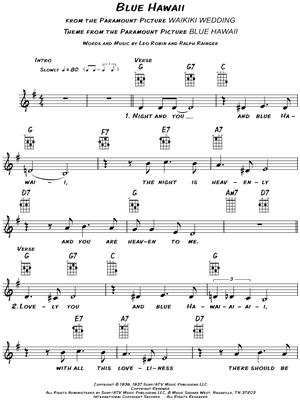
- Elvis blue hawaii music movie#
- Elvis blue hawaii music professional#
- Elvis blue hawaii music series#
In Blue Hawaii, though, no such foundation is provided for Chad Gates’s singing.
Elvis blue hawaii music professional#
In his previous films, Presley’s characters were usually portrayed as professional singers, or at least having had some musical background. The frequent crooning of Elvis’s character, Chad Gates, is offered without explanation. Blues, the Hawaii film fed sales of the soundtrack LP, and the album spawned repeat ticket-buyers for the film.
Elvis blue hawaii music movie#
Soon after the movie opened, the soundtrack shot to the top of Billboard’s album chart and stayed at the number one position for 20 weeks. The film’s soundtrack album became the most successful LP of Elvis Presley’s career.

The highlight, of course, is “Can’t Help Falling in Love,” which would become one of the songs most identified with Elvis throughout the rest of his career. Presley also shows great range in the music, which includes ballads, love songs, Hawaiian numbers, and a couple of uptempo rockers. There’s not a single clunker among them, and all are well delivered by Elvis, whose voice was never better at age 26. A dozen others are interspersed throughout the movie. In all, there are 14 of them, starting with the title number over the opening credits and ending with “Hawaiian Wedding Song” during the film’s final scene. Other than his two documentary films, no other Presley movie features as many songs as Blue Hawaii. “Hal Kantor’s breezy screenplay from a story by Allan Weiss, is the slim, but convenient, foundation around which Wallis and staff have erected a handsome, picture-postcard production crammed with typical South Seas musical hula-balloo,” noted the review. Variety judged the story line to be light but workable. However, Elvis’s campy character calms down quickly and becomes more believable as the film moves forward. His first song comes when the car radio just happens to be playing the instrumental background music for it.
Elvis blue hawaii music series#
From his first appearance, Elvis voices a series of corny lines and exhibits exaggerated facial expressions. Unlike its two 20th Century Fox predecessors, Blue Hawaii is unpretentious from the start. It rose as high as number two in the magazine’s weekly chart of top-grossing films, and finished at number eight in its list of top-grossing films of 1961. In limiting the film’s success to the short run, Variety’s reviewer underestimated Blue Hawaii’s drawing power.

It is this sort of vehicle which the singing star seems to enjoy his greatest popularity, the kind his vast legion of fans seems to prefer him in, and Hal Wallis’ production for Paramount should enjoy wide-spread box office success over the short haul.” “'Blue Hawaii' restores Elvis Presley to his natural screen element-the romantic, non-cerebral filmusical-one which he has departed for more dramatic doings in his last few films. Variety’s review of Blue Hawaii on November 29, 1961, noted that Elvis was settling into his proper place in the Hollywood firmament: The success of Elvis’s first post-army film and the relatively low box office returns of 20th Century Fox’s two dramatic vehicles for Elvis- Flaming Star and Wild in the Country-brought into focus Presley’s natural place in the picture business. It was a formula of musical comedy laced throughout with plenty of Elvis tunes. For Paramount, producer Hal Wallis returned to the format that had worked so well for him and Elvis in G.I.


 0 kommentar(er)
0 kommentar(er)
